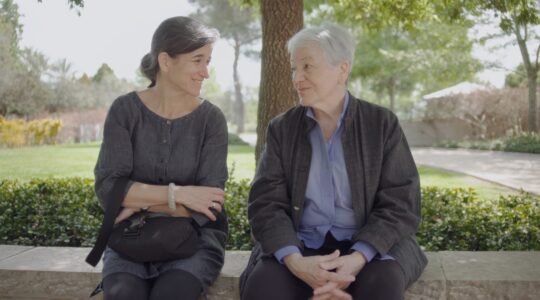To say that Mort Zuckerman is pessimistic about the Arab-Israeli conflict is a mild understatement. Speaking as a panelist at a forum last week on the lessons of the intifada, the publisher, real estate magnate and probable next chairman of the Conference of Presidents of Major American Jewish Organizations said “we are headed toward an extraordinarily difficult time,” the “most dangerous period since the 1973 war.”
Zuckerman predicted “the violence will escalate until something happens on the Arab side” to make it stop.
“The skeptics of the Oslo peace process have been proven right,” he told an audience of some 250 at the Center for Jewish History, asserting, “the seeds have been sown now for continuing the conflict.”
Zuckerman’s bleak outlook was shared by fellow panelists Martin Peretz, chairman and editor of The New Republic, the program’s sponsor; Laurence Grafstein, managing director of Grammercy Communications Partners; Leon Wieseltier, literary editor of The New Republic; and Michael Walzer, co-editor of Dissent.
Only Walzer, though, offered a defense of former Israeli Prime Minister Ehud Barak’s diplomatic efforts, and insisted on a partition plan as a lasting solution.
Wieseltier said it was not wrong for Israel to seek peace through the Oslo process, but that did not mean it has been or will be successful. He noted the “hard lesson” for Israel that “self-reliance cannot be mistaken for self-sufficiency” and that for all its independence, the Jewish state cannot make peace alone.
He also pointed out a major difference between David Ben-Gurion and Yasir Arafat when faced with a painful choice between holding out for a larger state or the moral realism of compromise. Ben-Gurion, to the dismay of many Zionists, opted for a small state where Jews would be a majority and which could be a safe haven. But Arafat “has always made the opposite choice,” Wieseltier asserted, allowing his people to live in misery while he clung to his refusal of territorial concession.
The “terrible lesson” of the intifada, Peretz said, is that the Palestinians are not fighting over Israeli settlements or borders but the very existence of the Jewish state.
“Most of us agree that Oslo was a predictable and predicted disaster,” he said, pointing to the failure of the Palestinians to abide by the agreements and an increase in anti-Semitism and Holocaust denial, as well as the denial of any Jewish historical connection to the land.
Peretz singled out for criticism Dennis Ross, saying the State Department’s chief emissary “spent 12 years convincing us Arafat was a fit peace partner” and then “blithely” stated in a recent interview that Arafat did not want or could not make peace. Peretz expressed amazement that Ross displayed no remorse or responsibility “for helping Israel along in making drastic compromises” these last many years.
Grafstein, a former New Republic staff writer, took a hard line, arguing that Israel should do whatever it feels necessary militarily to provide security for its people, including taking back land ceded to the Palestinians.
“The central element to me is that the Palestinians don’t recognize the Jewish right to exist,” he said, based on their refusal to concede Jewish sovereignty over the Temple Mount.
Walzer, in defending Barak, offered an impassioned defense of the partition argument, insisting that the notion of two states for two peoples still holds, based on the concept of ein breira, there is no alternative.
He acknowledged he was shocked at the Palestinian insistence at Camp David last summer on the right of return for refugees, and agreed “the war now must be fought and won.” But he said “partition is still the only solution, not only morally but for Zionism and the assurance of a Jewish state.”
The real danger, Walzer said, is not existential but to Israel’s Jewishness, positing that if settlements continue to expand and be built, there will be one state, a Jewish one, for awhile. But eventually, as Israeli Arabs begin to outnumber Jews, unless their rights as citizens are stripped or they are expelled, they will achieve a majority in the Knesset and vote in the right of return, effectively nullifying Israel as a Jewish state.
Walzer said the “chief threat to the Jewish state in the future is the settlements.” He called on Israel to plan to bring the settlers “home” within the country’s borders, and perhaps withdraw to boundaries easier to defend.
“There won’t be a Jewish state unless there is a Palestinian state,” he warned.
Several of the panelists agreed the settlements were a hindrance to peace, though Peretz distinguished between settlements in Gaza, which require “so many soldiers to defend so few people,” and those like Ma’ale Adumim, now a city of 35,000, which he said defends Jerusalem from the Jordan Valley and strengthens Israel.
Zuckerman said Walzer was “demonizing [Israeli Prime Minister Ariel] Sharon,” and asserted, “the 1967 borders are not secure borders.”
During the question-and-answer period that followed the presentations, a member of the audience lectured the panelists, insisting that dictators from Hitler to Arafat carry out just what they say they will, even if it seems too horrific for the world to believe.
Take Arafat at his word, the man cautioned, when he says he intends to eliminate Israel.
The man turned out to be Abe Rosenthal, former executive editor and columnist of The New York Times, who exited, front stage left, soon after his remarks, which went unchallenged.
The New York Jewish Week brings you the stories behind the headlines, keeping you connected to Jewish life in New York. Help sustain the reporting you trust by donating today.




